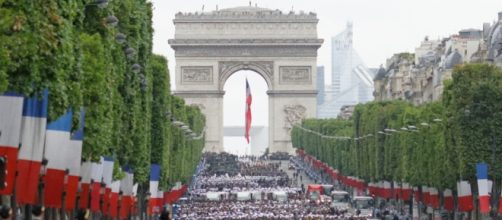July 14th, 2017 marks the 228th anniversary of the storming of the Bastille prison in Paris. Known as le 14 juillet throughout France and Bastille Day throughout the English-speaking world, July 14th is full of fanfare and a military parade across Paris. This year, things will be a little different. Here’s why.
President Trump's visit to Paris, and the protests
This year, United States President Donald Trump accepted French President Emmanuel Macron's invitation to visit Paris for the holiday. Though there is a diplomatic meeting scheduled, it is undeclared whether the two will discuss the recent controversy over the G-20 summit and the American position on the Paris accord.
Many Parisians are far from elated. In fact, a local activist movement calling themselves “Paris against Trump” has plans for a “No Trump Zone." The organization’s Facebook page describes the protest, which will take place at the Place de la République. The protest is backed by another movement, Nuit debout, which was organized to protest the El Khromi law, which proposed labor reforms favoring employers over employees in severance and lay-off scenarios. Considering the recent violence witnessed in Hamburg, Germany during the G-20 riots, some are skeptical of the event.
The Nice anniversary
While Paris celebrates and rallies, much of the country will mourn. July 14th, 2017, also marks the first anniversary of the deaths last year in the Nice terrorist attack, where a driver plowed through crowds leaving 86 dead and 435 injured.
The coastline will not exhibit parades and an air of celebration, but one of remembrance and tasteful memorials. USA Today cited that some residents were even fearful, with a large crowd drawn to the city once again. The reconstruction of the city has been completed, but is only one step in the long healing process for the region and the country.
Remembering WWI
It has officially been 100 years since U.S. troops entered WWI. What many expected to be a celebration of the alliance of two western powers now seems like fond memories of a dying relationship. It is obvious that there is a lack of support for the U.S. president, even in a diplomatic sense, from the French people. Still, the anniversary will serve as a reminder of the First World War and a celebration of military history, even if it seems turbulent at present.
What it all means
Celebration, memorial, and protest all converge into one day. The traditional French holiday celebrations will continue, activists will unify, and the families of victims and residents alike will gather in remembrance. Several examples of unity will occur, yet they will all be contradictory. It promises to be a significant celebration nonetheless.


